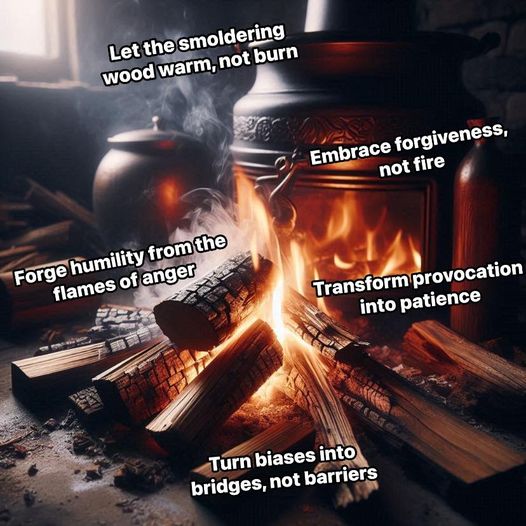
Anger is always a response to something; it never emerges without a reason. It typically surfaces when we face unpleasant experiences or provocations from others. By itself, anger isn’t inherently bad, but when directed at others, it becomes problematic because our judgment is then driven by emotion rather than reason. Anger is like a piece of smoldering wood: if not controlled, it can turn into a bonfire. Our biases and prejudices can significantly amplify this reaction, as they predispose us to interpret situations through a skewed lens. When confronted with a provocation or unpleasant experience, these preconceived notions can cause us to react more intensely and irrationally. Instead of assessing the situation objectively, our biases might lead us to feel personally attacked or unfairly treated, fueling our anger and making it harder to control. This can turn a manageable ember of irritation into a raging inferno, clouding our judgment and escalating conflicts unnecessarily.
The impact of anger extends beyond the individual, affecting family dynamics and societal harmony. Like a garden that turns into a barren desert under harsh conditions, unchecked anger can strip away the joy and connectivity within relationships and communities. It can transform a once-thriving environment into one of desolation and discord.
The most effective approach is to stay patient in the face of any unpleasant situation or provocation. Allow it to burn within without letting it spread. This resolve creates a profound peace within us, shielding us from any hostility. This spirit of faith transforms our anger into forgiveness. We overlook provocations and remain unshaken, no matter how hard someone tries to disturb us. Remarkably, we can even derive sustenance of humility and humanity from the very things meant to disrupt our peace.
Imagine anger as a brewing storm. If we give in to it, it unleashes chaos, but if we harness its energy, it becomes a gentle rain, nourishing our inner calm. Like a tree standing tall against the wind, our patience roots us firmly, preventing the storm from uprooting our serenity. The fire of anger, when contained, can be the hearth that warms us, rather than the blaze that consumes us. This transformation is akin to turning a rough diamond into a polished gem, where the friction of provocation reveals the brilliance of our true nature.
By converting anger into a force for personal growth and understanding, we can prevent it from scorching the landscapes of our lives and instead use it to foster a garden of peace and harmony.

